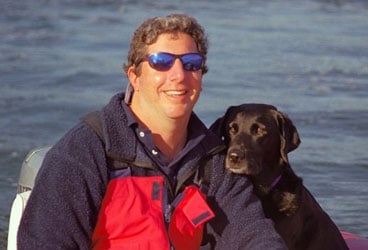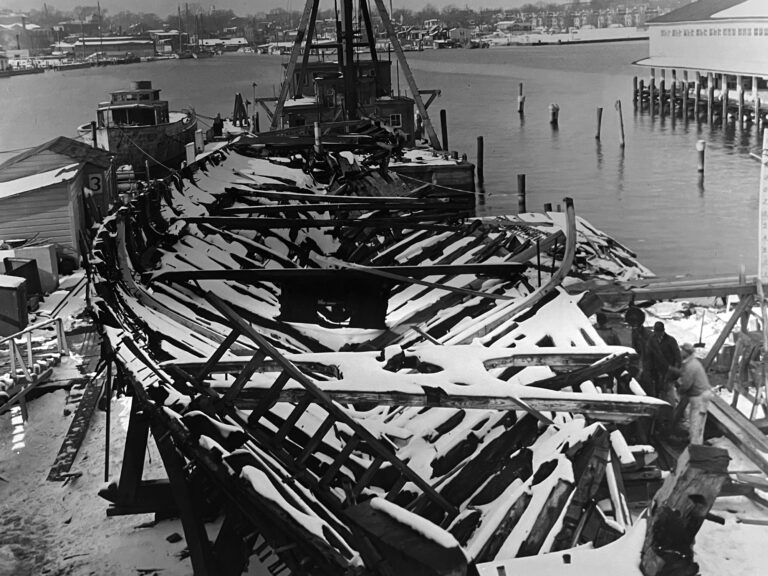
Werblow New
For more than half of Adam Werblow’s 40 years, college sailing has been a primary part of his life. In 1988, after a successful collegiate career at Connecticut College, he landed a coaching job at St. Mary’s College in Maryland, a small state-funded honors college with spectacular waterfront access on the St. Mary’s River, a tributary of Chesapeake Bay. He’s been a fixture there ever since, building the program into one of the most respected in college sailing. Currently the Seahawks occupy the top spots in the coed and women’s Sailing World College Rankings; positions the team backed up last weekend with a first at the Dellenbaugh Trophy at Brown and a second at the Admiral’s Cup at Kings Point. After 20 years of working weekends, long road trips, and college shenanigans, Werblow says he enjoys his job as much as he always has, which may be a big part of the reason his team is so successful.Nearly 20 years at the same job, that’s some serious longevity, especially for a college sailing coach.If I won the lottery tomorrow I’d probably still do what I do. We have great kids here; it’s a beautiful place. I came here thinking the place had a ton of potential and this week we’re breaking ground on a new $4 million sailing center. I still feel like the place is teeming with potential. It’s always been fun and exciting, with good people, so all those things combine for good things.You’re currently ranked No. 1 in coed and women’s college rankings. Did you anticipate being so strong this spring?At the risk of making the Sailing World rankings tangential to our life, the reality is that I don’t even know what our rankings are. What we try to focus on with the team-coaches and sailors alike-is we try to get incrementally better. We try to keep having fun, a little bit every day, and hope that we’re always competitive enough to be one of the teams to vie for each regatta that we go to. On Friday Ann Campbell sends out the rankings showing that we’re No. 1, then Yale beats us by 18 points at the Admiral’s Cup at Kings Point and we finish second to last at the Moody Trophy. We try to take all of those things-whether people think we’re great or terrible- with a grain of salt. Tomorrow we’ve got to go out and hope we’re better than the day before.You did have a pretty good weekend, second in a huge coed intersectional, the Admiral’s Cup, and then a convincing win at the Dellenbaugh Women’s Regatta at Brown.We’re happy. We were really happy with the women’s thing, they’ve been getting on track and trying to get some traction. In both regattas we were starting freshman as skippers in B division. It’s just nice when they can show they’re good in not one or two conditions, but can play in all conditions. Sara Morgan Watters, she’s had a good little run here the last few weeks with Mattie Farrar and Jennifer Chamberlin, they’ve really been doing well. We won both the St. Mary’s Women’s and now the Dellenbaugh by a lot of points and seem to be getting a hold of how the game works. They’re fun to coach, fun to be around, good competitors, good sports, it’s cool.That’s a hike back home, from Providence to St. Mary’s, on a Sunday night and in some pretty miserable weather. How do you handle that aspect of the sport?We try to compartmentalize things. We don’t have any control when we go to an event, when the racing is going to be over, how hard the wind blows, whether it’s raining. We try to make life as comfortable for ourselves as we can. The kids on the team try to look out for one another, care for one another. They try to work it out and make the time pass as pleasantly and effortlessly as possible. Driving home yesterday was a grind, no doubt about it. But the end game was we made it back, we’re safe, and that’s a win.Can’t hurt coming home with a win either. How important are individual event wins for a team like St. Mary’s that may be looking down the road to the national championships in a few weeks?No question we’re psyched with a win at the Dellenbaugh and psyched to finish second at the Admiral’s Cup. But the real focus for us is we want to be able to put into action on the weekend what we’ve been trying to work on during the week. If we are in team racing, if we’re working on a 2-3-4 combo for two weeks in a row, we’d like to see we’re showing progress on the 2-3-4 combo when we get to team race on the weekend. For us our focus is much more narrowly defined in that way, than let’s go and win the regatta. We’re very much focused on trying to look at the pieces of the game.What sort of changes do you notice in the sport from when you started coaching in 1988?There are more high-quality elite programs. The game has changed. If you look at the measure of what it takes to be an elite program today: high level coaching, a fleet of boats, travel budget, and some good sailors. If you did those things 20 years ago you would’ve been competing against no more than 4 or 5 teams. Now you’re competing against 40 teams. The game is harder; it’s more competitive. Again that’s why we try hard not to look at any one moment. We don’t look at this regatta, that regatta. Sure if at the end we were able to put ourselves in position to win the national championships, we would always look back on that fondly. But the reality is it’s about the journey. For the coaches and for the teammates, we have a real pride in looking at the progress that each kid can make over the semester, and hope that each of us have a part in that. For our team, the big news a week ago was not necessarily winning the MAISA Team Racing Qualifiers. It was nice to win the qualifier, it’s something we’ve been working on for a while. But a little campaign within our season was having one of our crews, Keisha Pearson, sail with another crew on our team, Sarah Gilmer. We put them in a boat together to go sail the President’s Trophy at Boston University so [Sara Morgan Watters] could sail in A division at a women’s major regatta and give Adrienne Patterson and Melissa Pumphrey a week off. It was a little mini campaign. Everybody had a part in helping them prepare for the event and we went up to Boston University and finished third in that regatta, sixth in B Division. That was kind of a team win for us; everybody was psyched for them.What about recruiting? Has that aspect of your job changed at all in 20 years?For me, it’s been similar in terms of my outlook, which is basically we want the kids, whether they come here or go elsewhere, to chose the right college. Within the 200 schools that have college sailing, there should be the right match for people who are into sailing. Our school is special place, it’s 2000 students, a public honors college for the state of Maryland, sailing is dead center on campus, they’re building the new sailing center here, it’s an exciting place to be. But it’s not for everyone. I try really hard with Bill Ward to focus, and Mike Ironmonger for that matter, to focus on the kids who are in our program now and I don’t spend a lot of time focusing on the kids who are in high school. Certainly not everybody operates that way. For me I’m most comfortable with that. If we do a nice job with the kids we have, other people will want to come. You have the Middle Atlantic district (MAISA) Women’s Qualifiers this weekend. Given your recent success are you fairly confident heading into the event?The disparity of the teams just isn’t that great when you’re sailing in smaller competitive fleets. We seem to really do our best work in the major intersectionals where we have super-competitive situations, every windward mark is contested, every starting line, and you sail a little bit differently, use a different skill set than it might take to qualify. The women’s qualifiers, for instance, we’re probably going to have 12 teams and of those 12 teams, probably half are able win any race. It’s hard when it’s a small fleet and things get spread out, the passing lanes are fewer and far between. How important is drawing talented high school sailors to the success of a college program? Can you build a top team from raw recruits?Talent helps, work ethic helps. One of the best high school coaches out there is coaching the Newport Harbor High School team, Caleb Silsby. When he came to our team, on his own admission, was probably the fourth of fifth best skipper in his freshman class. By the time he graduated, he was probably one of the four or five best guys in college sailing. Drive, work ethic, and a little bit of savvy goes a hell of a long way. If somebody has all those things, they can make a coach look good.It doesn’t seem like many top college sailors are making the transition to Olympic-level sailing. Is this something college sailing should be concerned about?As the game of college sailing has shifted a little bit, the Olympic sailing thing has shifted and you’re seeing, in other countries, national-level campaigns where there’s lotteries funding the program and people are starting to train to be Olympic sailors at a young age and bypassing college. You look at some of our recent superstars of college sailing and try to assess how they’re going to be matched-up versus other countries’ top players and make the argument: Are they better served by college sailing or are they better served by never going to college and training fulltime for the Olympics? The question is much broader than a sailing question. At the Olympic level, you have to be the most talented, the most driven, and get to all of these events and have excellent coaching, have all of the pieces, excellent equipment. There are so many pieces in the puzzle. College sailing does a great job of preparing you for some of those, it certainly does not do a great job of preparing you for all of them. Putting your boat in a container going halfway across the world, that’s not a big part of what we do in college sailing.College sailing was designed so people could do it and attend college. Does it do everything we’d like to do as the ultimate trainer the Olympic program? Definitely not. It’s really a thing to do when you’re in college for a fantastic collegiate experience, and hopefully it’s a part of what makes someone a complete sailor at the end.Do you have any goals for college sailing over the next decade?I think the college sailing is on the right track with keeping its focus to be a more purist game, where we continue to not offer scholarships, where we are a highly competitive sport, and where it’s a part of the overall college experience. I hope we continue to grow so that there are more and more colleges and more and more people can enjoy it. It’s a sweet competitive game, and it’s a great way to improve your sailing and to make friends that will last a lifetime.









